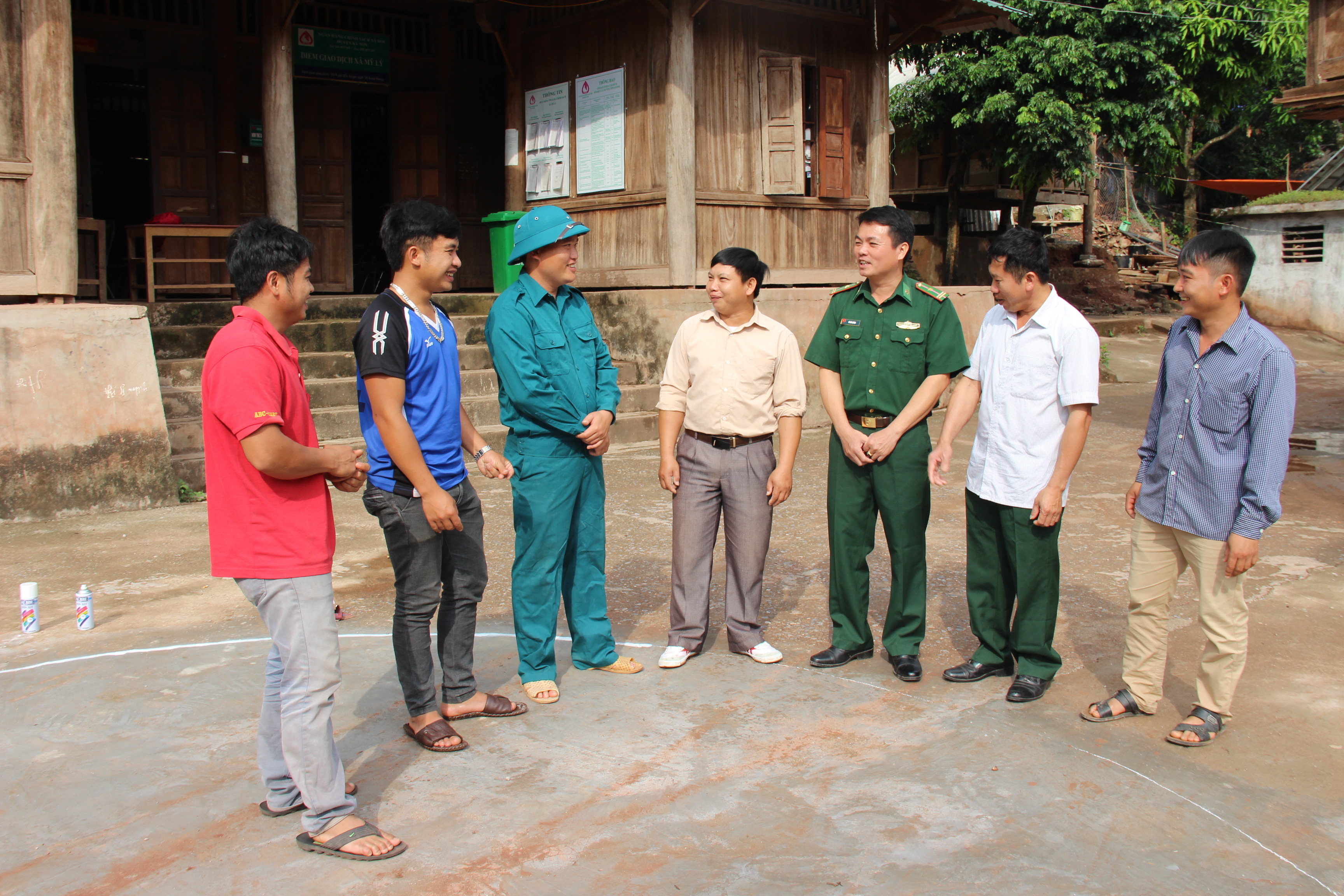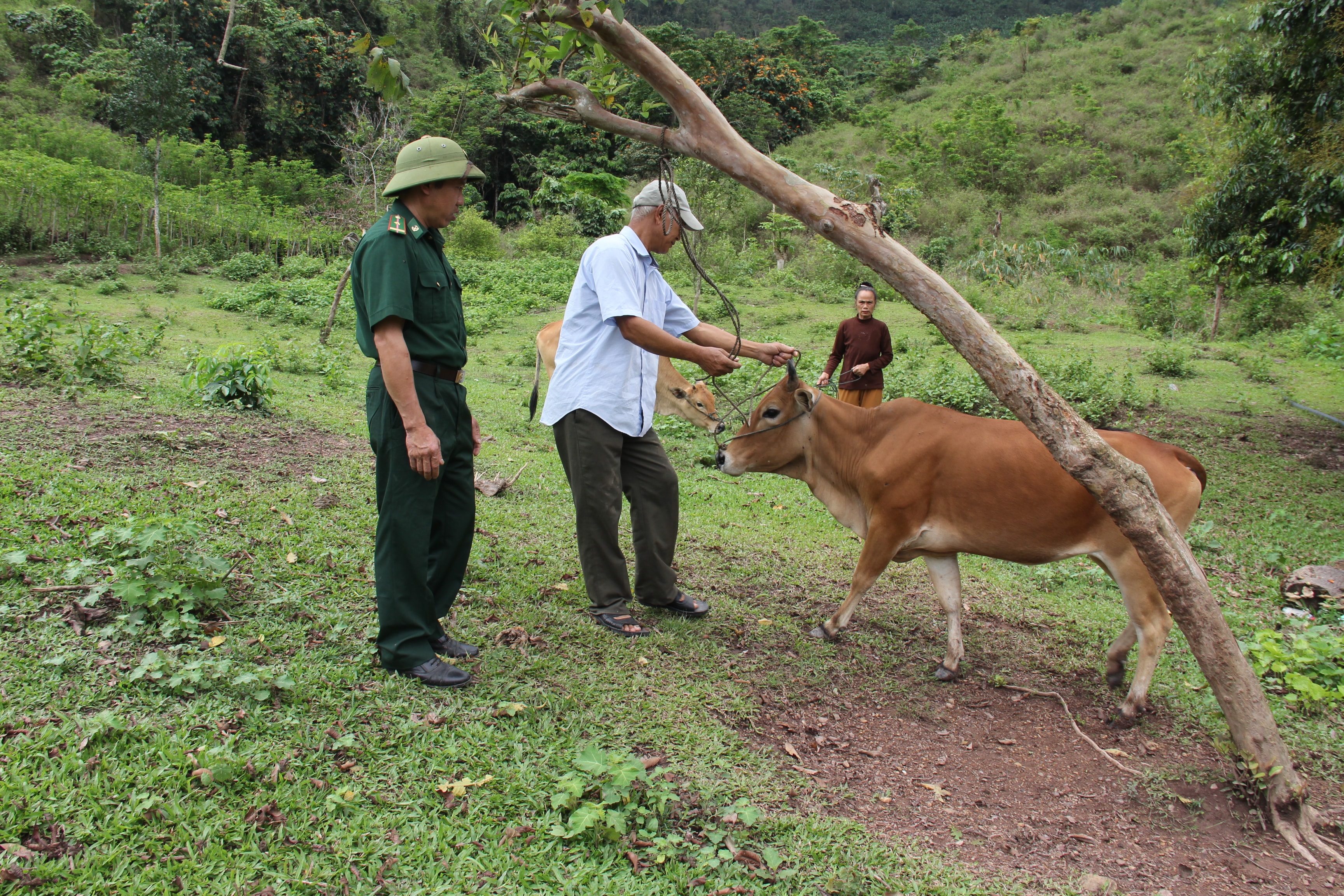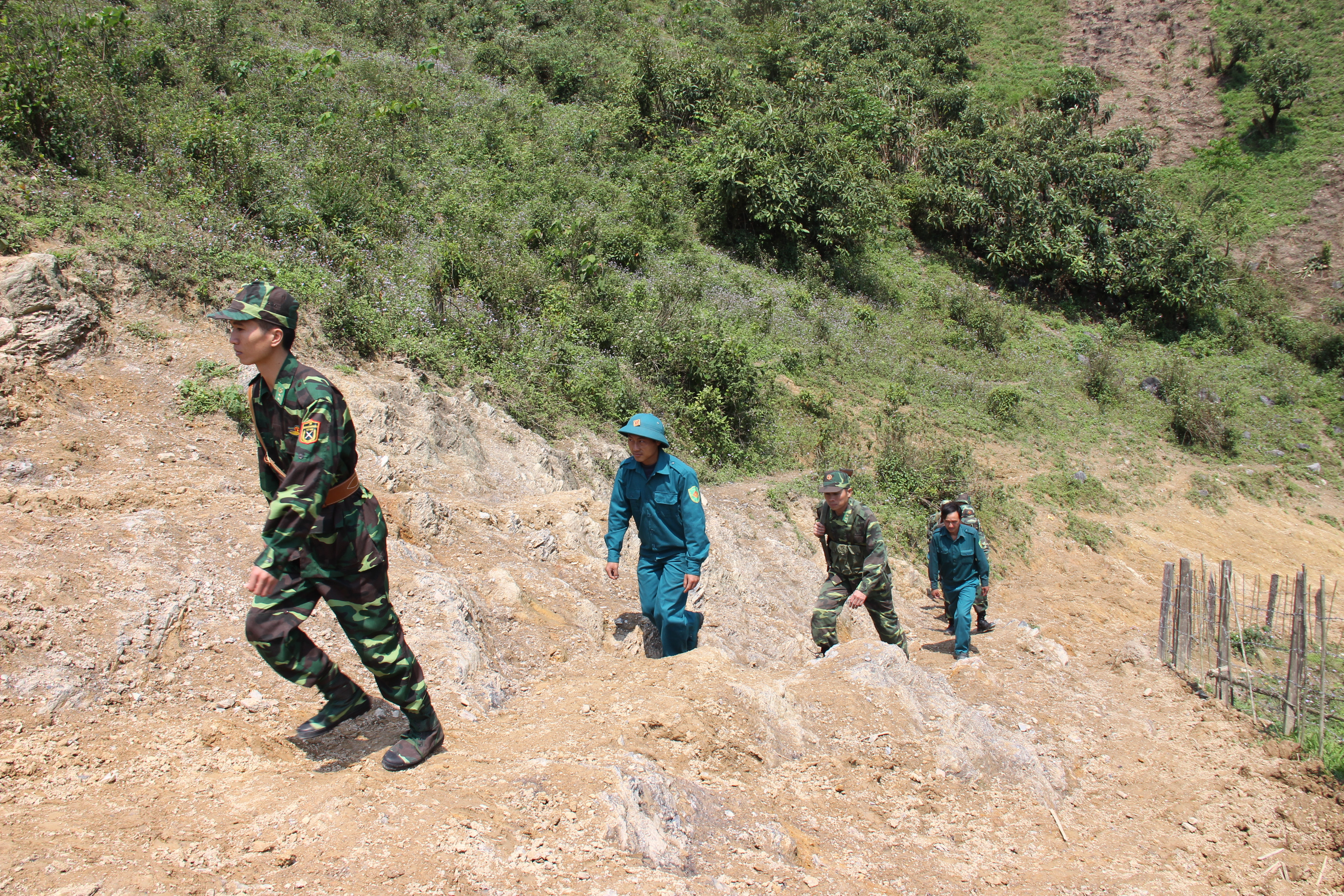Lesson 2: Dedication, effort, creating new momentum
(Baonghean.vn) - Having the opportunity to visit the western border area of Nghe An, where border guards were reinforced to hold the position of Deputy Secretary of the Commune Party Committee, I could clearly understand the silent contributions and affection that the local Party Committee, government and people have given to the children of the village. This also affirms the correctness and timeliness of a policy.

Strengthening border party members at the grassroots level: Adding 'steel' to village party cells
(Baonghean) - In recent years, Nghe An Provincial Party Committee has coordinated with the Provincial Border Guard Party Committee to effectively implement the policy of sending border guard party members to strengthen the grassroots. Thereby, it has contributed to creating changes in changing working methods, developing party members, preventing the risk of party cell whitewashing, and strengthening national defense and security in difficult areas...
Changing working methods, creating human resources
From what they "saw and heard", the greatest benefit that the reinforced border officers brought to the base was to contribute to training and improving the leadership and management capacity of the communal staff, maintaining working order, and eliminating the "5 no's" working style (no leadership resolution, no work plan, no regulations, work program, no schedule, no regular activities) in some localities in the past.
My Ly is a commune with a large area, a 43.5km long border with 1,129 households, 5,500 people, mainly Mong, Thai, Kho Mu ethnic groups, living in 12 villages. In which, the farthest villages are Pha Chieng, Cha Nga, about 20km from the commune center. In January 2015, Major Vo Van Quynh was assigned to hold the position of Deputy Secretary of the Party Committee of My Ly commune. Realizing that the current state of local government operations still has some limitations such as: Working style is heavy on brotherhood and clanism; compliance with internal rules and regulations is not strict; Regarding the outdated document storage system, slow implementation of official documents..., Comrade Quynh advised the Party Committee and the Government to propose many solutions to amend the working style, improve the operational efficiency and management effectiveness of the Party Committee and the Government, such as building operating regulations, working schedules of the Party Committee, People's Committee, operation plans of mass organizations, clearly defining work and people to avoid reliance and shirking responsibility between departments... Thanks to that, there has been a clear change in compliance with working hours and service style for the people.
 |
| Border guards of My Ly Station, Ky Son district talk with commune officials. Photo: HT |
As for Major Ho Xuan Tuyen, in 2012, when he was assigned to work as Deputy Secretary of the Party Committee of Tam Quang Commune (Tuong Duong), an area with 1,827 households and 7,479 people including 5 ethnic groups (Kinh, Thai, Kho Mu, Tay Poong, Hoa) residing together, he directly "held hands and guided" the team of commune-level civil servants to overcome weaknesses in information technology and document drafting skills. Thanks to that, 100% of the staff are now proficient in using computers. Tam Quang is also one of the few commune-level units to develop electronic textbooks and use projectors to disseminate resolutions, guidelines and policies of the Party and State. Mr. Lo Van Ly - Secretary of the Party Committee of Tam Quang commune shared: The positive change in the working style and administrative hours of the commune is thanks to the border guards' increased support and advice to the Party Committee and the commune government to step up inspection and supervision work, and assign cadres to stay close to the grassroots. Accordingly, each member of the Standing Committee must direct and stay close to 2-3 village Party cells, and the border guards themselves strengthen their role as role models in choosing the 3 most difficult villages. Thanks to that, up to now, Tam Quang commune has achieved 15/19 new rural criteria and is striving to reach the finish line in 2017. The commune Party Committee has been recognized as clean and strong for 6 consecutive years. Deputy Secretary of the Party Committee of the commune Ho Xuan Tuyen was elected to hold many positions in the locality such as: Deputy of the Propaganda Department, Deputy of the Construction Department of ATLCSSCĐ Bases, Head of the Legal Department of the Commune People's Council...
At Ngoc Lam resettlement commune (Thanh Chuong), Deputy Secretary of the Party Committee Nguyen Danh Hieu also clearly demonstrated the spirit and responsibility of the cadres in advising the local Party Committee and government to consolidate the political system, train cadres, and develop party members. "In addition to creating resources from the rural youth force and mass organizations, many unemployed university graduates have been paid attention to by the Party Committee and government to be recruited into the Party, supplemented for the mass organizations in the villages and hamlets, and arranged into positions in the commune-level political system such as Ms. Vi Thi Huong, graduated from Nghe An College of Education, currently working at the commune Party Committee office; Ms. Le Thi Thuan, graduated from Law University, Vice President of the Commune Women's Union; Ms. Vi Thi Hoai, graduated from Nghe An College of Economics, is the Standing Member of the Commune Women's Union..." - Comrade Hieu shared.
Comrade Vi Hoe - Secretary of Ky Son District Party Committee (the unit selected to pilot the model of sending border guard party members to work as Party Committee Secretaries of communes) said: The prominent role of the strengthened Border Guard is to advise Party committees and authorities to guide and direct mass organizations at all levels to build and supplement working regulations and maintain their implementation quite seriously. The working style and manner of the cadre team has gradually become orderly, overcoming the previous situation of arbitrary working. The work of propagating, disseminating and implementing the Party's resolutions, policies and laws of the State for cadres, party members and people to implement more fully, qualitatively and promptly. Planning, training, and using appropriate cadres, promptly filling vacant positions, boldly arranging young, capable, and qualified cadres for key positions in the political system and sending them for training to improve their professional qualifications to serve immediate tasks and create a long-term source of cadres for the locality.
 |
| Officers of My Ly Border Guard Station guide people in taking care of their livestock. Photo: HT |
Create solidarity and stability at the grassroots level
Border guards who have strengthened their grassroots positions also act as a bridge between local Party committees and authorities with border guard station committees and ethnic people in the area. Major Tran Dinh Hoang - Deputy Secretary of the Party Committee of Muong Tip commune (Ky Son) is an example. Upon taking on the new assignment, realizing that there were some issues within the commune cadre team that needed to be rectified, with sluggish and ineffective working styles, the first thing Major Hoang did was to advise the Standing Committee of the Commune Party Committee on measures to build and strengthen solidarity within the Party committees and authorities, gradually reform working regulations, and create changes in both awareness and actions of the team of full-time and part-time cadres at the commune level. Major Hoang shared: “In all cases, I have to play the role of a “middle man” as a bridge to create solidarity within the team. To do this, I have to create trust through impartiality, objectivity, and “words go hand in hand with actions”...
Commenting on the reinforced border guards, Secretary of the Muong Tip Commune Party Committee Moong Pho Tuc said: The commune has 9 villages divided into 3 clusters, with sparse population density and difficult roads. For example, to get to the Cha Lat, Huoi Khoi, Huoi Phe village clusters, you have to walk for 3 hours. Some other villages such as Pha Noi village are 32km from the commune center on mountain roads, 20km from Muong Tip Border Guard Station... However, with a close-to-the-base style, close to the people, officer Hoang has promptly advised the locality to resolve problems in a reasonable and emotional way, contributing to stabilizing the area, creating conditions for people to feel secure in production. Like the case of Mr. Lau Ba Tenh, born in 1982 (Cha Lat village), who was taken advantage of by bad people to treat his illness and lure him to convert to Protestantism and remove the ancestral altar according to Mong customs, Major Hoang and the commune officials coordinated with Muong Tip Border Guard Station to persistently propagate and persuade. After 1 week, Mr. Tenh gave up the idea of converting to Protestantism and restored the Mong altar.
Similarly, Nam Can commune (Ky Son) is home to three ethnic groups: Mong, Kho Mu, Thai, with different characteristics, customs, and practices influenced by localism, brotherhood, and clan ideology. When he was appointed as deputy secretary of the commune, Major Tran Huu Phi spent time researching and finding solutions to build internal solidarity with the motto "those who know a lot teach those who know little, those who know little teach those who don't know", "speak frankly, speak the truth" in conferences, creating an atmosphere of solidarity, innovation, and democracy in the past two terms. Thanks to that, many outstanding issues in the area have been resolved such as: land disputes between Huoi Poc (Nam Can) and Huoi Ngoi (Na Loi) villages; preventing illegal Protestant missionary activities; developing two party members to eliminate the risk of the Khanh Thanh village Party Cell being wiped out.
Overcome the mindset of waiting and relying on others
Identifying one of the "obstacles" in hunger eradication and poverty reduction in the Western region is the mindset of waiting and relying on cadres, party members and ethnic minorities, the border guards have actively advised the Party Committee and the government to effectively implement the Government's programs 135, 167, 30A and appropriate projects to promote potentials, advantages, and promote economic development in each locality. In particular, focusing on reclaiming and intensifying rice fields, converting crops and livestock, promoting the development of local specialties to become commodities, and increasing income for people. Building models of household economic development, at the same time directly mobilizing "hand-holding" to guide people to implement, not to rely on the State's famine relief rice. Many household economic production models that bring high economic efficiency are being replicated, such as: Growing elephant grass, raising buffalo and cows in Na Ngoi and Nam Can communes (Ky Son); growing agarwood in Tam Hop commune (Tuong Duong); raising cows in Nam Can commune (Ky Son), passion fruit growing model in Tri Le commune (Que Phong); green squash and watermelon in Phuc Son commune (Anh Son); raising black chickens in Tam Hop commune (Tuong Duong); growing ginger and taro in Na Ngoi and Muong Tip communes (Ky Son); cow and pig raising model in Chau Khe commune (Con Cuong), model to help people reclaim flooded rice fields and convert from 1 rice crop/year to 2 rice crops/year in Tam Hop, Mon Son, Tri Le communes... completely changing the lives of people in the area.
Along with economic development, the movement of "All people unite to build cultural life in residential areas" and build cultural highlights in the highlands has been strongly promoted. Currently, about 80% of the population in border areas can watch television, 100% of border communes have landlines, 27/27 communes are covered by mobile phone networks, 100% of communes have communal cultural points, 90% of villages and hamlets have community houses... contributing to improving the material and spiritual life of people in border areas.
 |
| Border Guards at Nam Can International Border Gate coordinate with the youth union of Nam Can commune to patrol and protect the border. Photo: HT |
Comrade Le Quoc Khanh - Deputy Standing Committee of the Provincial Party Committee's Organization Board: Based on the current situation of the quality of political system operations in remote communes in mountainous areas, which is still inadequate and the requirements of protecting sovereignty and border security in the new situation. Right from the end of 2002, based on the advice of the Provincial Party Committee's Organization Board and the Provincial Border Guard Command, Nghe An Provincial Party Committee agreed on the policy and issued Decision No. 23-QD/TU on the functions, tasks and powers of Border Guard officers strengthening border communes, in charge of building political bases and national defense and security work. Implementing the policy of the Provincial Party Committee, the Provincial Border Guard Command coordinated with the Ky Son District Party Committee to conduct a pilot project, transferring 11 border guards to hold the position of Deputy Secretary of 11 border communes in the area. After 1 year of implementation, evaluation and experience drawing, the model continues to be deployed in border communes of Tuong Duong and Que Phong districts and the area of 2 resettlement communes of Ban Ve hydropower plant in Thanh Chuong district.
For nearly 15 years, the reinforced border guards have always devoted themselves to working with local Party committees and authorities to consolidate and build a strong grassroots political system, firmly maintaining the border areas of the Fatherland. Currently, 25 comrades are being deployed to reinforce 24 land border communes, of which 1 comrade holds the position of Party Committee Secretary, 24 comrades hold the position of Deputy Party Committee Secretaries of border communes...
Nghe An has a 419 km long land border, adjacent to 3 provinces (Hua Phan, Xieng Khouang, Bolykhamxay) of Laos, including 27 communes, belonging to 6 border districts, with a population of about 120,000 people, mainly ethnic minorities. The border area of Nghe An province is an important strategic area in terms of economy, national defense, security and foreign affairs.
(To be continued)

